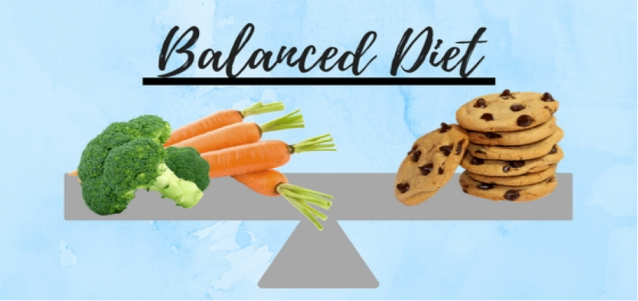By: Emma Slattery, ’18, University Health Center Nutrition Peer Educator

You turn on the news, open Facebook, or read a magazine and are instantly bombarded by messages about food. You read that “apples are good, carbs are bad, you shouldn’t eat cake, cheese is bad for you, but salads are healthy”. The messages are everywhere and in black and white. Eat this and not that. One food is healthy and the other food is unhealthy. And we’re all trying to be healthy, right? These messages may cause you to start limiting the number of times you eat a food that’s deemed “unhealthy”, or you cut certain foods out of your diet altogether. You might start eating a few extra foods that are “healthy”. So what if you hate kale, it’s supposed to be healthy right? So you eat it anyway. You end up eating a lot of it. Little by little you start adopting more and more of these food rules on what you “should” and “shouldn’t” eat. And this makes your diet healthy, right?
Not exactly. The reality is that your diet CAN be too “healthy”. I put healthy in quotation marks because a healthy diet isn’t quite as cut and dry as people make it out to be. For example, there are certainly healthful foods. Broccoli is a healthful food that is high in fiber and tons of vitamins but eating a diet composed mainly of broccoli every day certainly is not healthy. This is because your body needs a wide variety of nutrients! If you can remember the 5 food groups; fruits, vegetables, grains, proteins, and dairy; they’re grouped based on the nutrients they offer. Each food group represents a different class of nutrients and you need all of them in your diet. A “healthy diet” isn’t really healthy if you’re completely cutting out a food group because then you’re completely cutting out a group of essential nutrients that your body needs.

Additionally, no foods are truly “good” or “bad”. One or two (or even three or four) cookie will not kill you, it won’t make you gain weight or ruin your eating habits. The same goes for a brownie, a piece or cake, or French fries. Occasionally the pursuit of eating “healthy” can interfere with someone’s ability to enjoy the foods they love. And when the pursuit of healthy eating interferes with the ability to enjoy food, a pattern of disordered eating can emerge. Orthorexia nervosa is disordered eating characterized by an obsession with healthy eating. Ultimately a healthy diet shouldn’t interfere with your enjoyment of life. It’s about balancing your sweet foods, salty foods, fun foods in moderation with your healthful foods.
A few great tips for enjoying a healthful diet are to:
- Eat mindfully in a relaxed environment
- Enjoy a “fun food” today
- Try a new food or recipe this week
- Enjoy your favorite foods from each of the five food groups
- Honor your hunger and fullness by eating when hungry and stopping when comfortably full
For more information on how to balance your diet, take advantage of the free Nutrition Coaching Service at the University Health Center. To reserve your session, call 301-314-5664 or email nutritioncoach@umd.edu.

